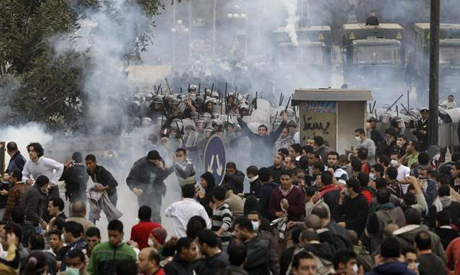
The cost estimates exclude losses to human life, infrastructure damage and business and foreign direct investment losses (Photo: AP)
Egypt’s Revolution has cost the country, up to September, US$9.79 billion, according to a report issued by consultancy group Geopolicity.
Titled “The cost of the Arab spring & Roadmap for G20/UN support”, the report shows results of a costing exercise undertaken by Geopolicity, based on data from the International Monetary Fund (IMF).
It accounts for the impact of productivity losses on GDP and public finance, but excludes losses to human life, infrastructure damage and business and foreign direct investment losses.
The near 10 billion dollars shed by Egypt are divided among the $4.27 billion cost to GDP and $5.52 billion in lost public finances.
The report estimates that the uprisings that swept through six Arab countries this year have cost the most affected countries more than $55 billion. Egypt comes third after Syria and Libya, which have seen the bloodiest confrontations, lost $27.3 billion and $14.2 billion respectively.
Costing for the Arab uprisings, however, cannot be measured precisely, according to the report as “Many critical economic indicators are unavailable, and the situation is highly fluid.”
The report explains that the benefits of the uprisings remain “intangible” and that they currently contribute to regional destabilisation. It indicates that support programs should engage drivers of change in each country in “region-wide support program conceived and led by Arab states.”
Otherwise, the report concludes, outcome of uprisings will remain unknown and could potentially be regressive.
Despite losses to some countries, the report says that the Arab region as a whole is set to benefit economically from the Arab Spring on back of the rise in oil prices.
The report estimated that overall the year to September saw some $38.9 billion added to regional productivity.
Oil exporting countries, excluding Libya -- UAE, Kuwait and Saudi Arabia -- have seen their public revenues increase by 31.86, 27.7 and 25.13 per cent respectively.
These countries have not seen drops in their finances and have in fact seen growths in their respective GDPs because “They have not been affected by uprising and their economies are more progressive and growth oriented” the report reads.
Geopolicity also highlights the future role of Gulf Cooperation Council (GCC) to spearheading regional change “[countries] such as the UAE and Qatar, are key to developing a carefully-sequenced political, security and economic road map for the regionas a whole”
International support, however, should be stepped up for the region, according to the report. So far, it had fallen short of expectation given the magnitude of the challenge the region is facing. Promises of the Deauville summit in May, where international donors pledged $100 billion in aid to the region, have, to a large extent, not materialised.
Short link: